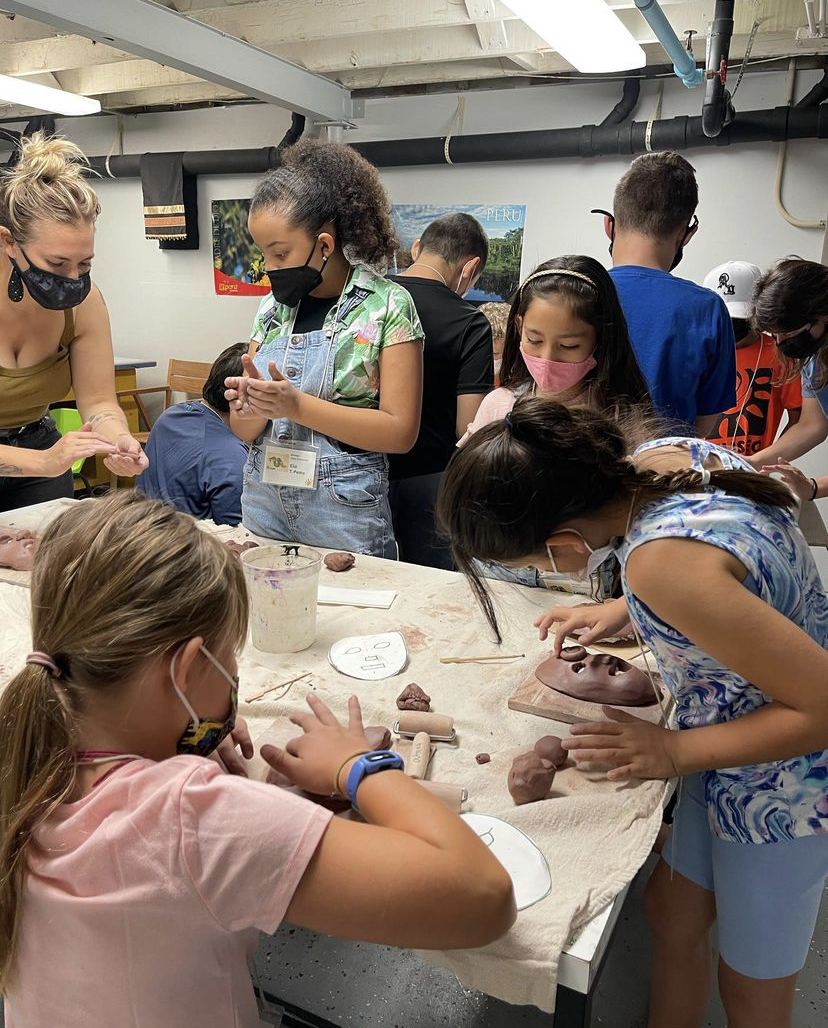You are here
Denver summer arts and culture program gets help from ESSER grant
Denver summer arts and culture program gets help from ESSER grant

Students work on a project at the Summer Arts & Culture Camp at Museo de las Americas.
The Summer Arts & Culture Camp at Museo de las Americas, a program for low-income youth in downtown Denver for the past 13 years, has a waiting list 20 to 30 students every year, which is why organizers hope that pandemic funding through a CDE grant will help make the program more accessible.
Museo de las Americas focuses on mitigating summer learning loss and building social and emotional skills by immersing students in the culture of a Latin American country. The art-based curriculum incorporates the academic subjects of science, language arts and social studies while fostering self-esteem and encouraging creativity in at-risk youth.
“They're not just doing arts and crafts,” said Sean Trujillo, program manager at Museo de las Americas. “They’re doing actual school learning activities that'll help stimulate their brains and their minds in the summertime.”
Museo de las Americas received $31,130 from the Expanded Learning Opportunities grant from ESSER III to help grow their program over the next three years. The plan is to increase attendance and offer more scholarships to families.
Carina Bañuelos-Harrison saw a new level of self-confidence in her 6-year-old daughter, Valentina, and 10-year-old son, Iker, during the end-of-the-session final performance. When she saw her son, who has autism, playing the drums she thought, “Who is that?” She was delighted.
“I've never even seen him be interested in a musical instrument or to even look as confident as he did. It just showed us that he very much enjoyed it,” Bañuelos-Harrison said. “Seeing my children have such a good time is all I think a parent could ask for.”
Although the summer camp is open to all on a first-come, first-serve basis, 90% of applicants are from the surrounding neighborhoods. Museo de las Americas’ neighborhood, La Alma/Lincoln Park of Denver, was identified by the 2021 Child Well-Being Index as a lower opportunity neighborhood because most of its residents live below the poverty line.
Roughly two-thirds of camp participants received scholarships last year. The ELO grant will enable the museum to provide scholarships for all students, allowing some to participate who might otherwise be unable.
Engaging with mentors from similar cultural backgrounds and building friendships with peers from different schools can have a long-lasting impact on children’s lives. It’s valuable for the kids to have these experiences that last a lifetime, even if they don’t realize it at the time, Trujillo said.
“One of the most valuable assets is being a culturally diverse and educational camp for the students,” he said. “We get so many different students and so many different parents from all different backgrounds.”
An important goal of the program is to create a safe space where kids can feel comfortable and supported. Bilingual instructors help create a welcoming environment for students, many of whom speak Spanish at home or attend dual-language schools.
Staff members and volunteers also try to understand and accommodate students’ individual needs.
“If you see somebody lonely, or if you see a student that needs a little bit more attention, then let's get them that,” Trujillo said.
The 2021 Summer Arts & Culture Camp’s theme was Ancient Mexico. Bañuelos-Harrison’s children were two of 45 students who received scholarships to attend. She appreciated that her kids could learn about their Mexican heritage in the educational setting of a museum. “It's helpful to kind of tie in with the things that we talk about at home,” she said.
She was also grateful that her kids could be themselves at camp. She initially worried about how Iker’s autism might impact his experience at camp but found that staff were receptive to learning how best to work with him.
“It's not very apparent from the exterior that my son has autism,” Bañuelos-Harrison said. Museo staff told her that getting to know Iker expanded their knowledge of what autism can look like. “So I think there was a lot of cross learning and education, not just with my kids at Museo, but also my kids teaching Museo.”



Connect With Us





